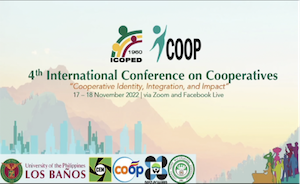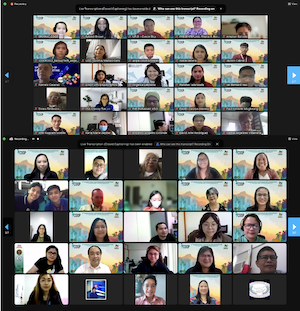 The Department of Science and Technology-Philippine Council for Agriculture, Aquatic and Natural Resources Research and Development (DOST-PCAARRD) supported and participated in the 4th International Conference on Cooperatives (ICOOP2022) held on November 17–18, 2022 via Zoom and Facebook Live.
The Department of Science and Technology-Philippine Council for Agriculture, Aquatic and Natural Resources Research and Development (DOST-PCAARRD) supported and participated in the 4th International Conference on Cooperatives (ICOOP2022) held on November 17–18, 2022 via Zoom and Facebook Live.
With the theme, "Cooperative Identity, Integration, and Impact," the said conferenceprovided a platform for elevating cross-country and cross-sectoral conversation around critical roles of cooperative identity, intra- and inter-cooperative integration, and impact creation in achieving a more balanced, inclusive, and progressive cooperative economy.
Three DOST-PCAARRD-funded projects were presented in different parallel sessions. Prof. Marlon Tambis of the Visayas State University (VSU) presented the project, "Enhancing the Development of Sweetpotato Food Value Chains in Central Luzon, Albay, Leyte, and Samar and Linkaging with Related Industries," under the Cooperative Integration session.
Prof. Tambis discussed how the project further strengthened the microenterprises and value chains established during its earlier phase; activities conducted to technically improve and optimize the developed vacuum fryer; and more products developed such as grates, wines, flour, and powder. He also highlighted how the most improved value chains were anchored by cooperatives and the significant improvements experienced by cooperatives such as the Moncada Women’s Cooperative in Tarlac and the Camote Creations Cooperative in Albay. These cooperatives were able to produce more products and had expanded their markets and partnerships effectively.
In the same session, Ms. Cheryll Gonzales, from the Municipal Agriculture Office of the Los Baños LGU, also presented the project, “Development of Inclusive and Resilient S&T-Based Vegetable Supply Chain for the New Normal.” Through this initiative, an inclusive and pandemic-resilient S&T-based integrated system and supply chain model were created to alleviate various pandemic-borne pressures across the agricultural value and supply chains. Ms. Gonzales emphasized the significant role of women in the endeavor as well as the benefits of building the capacity of farmer-cooperators to address farmers' improper practices, particularly pesticides usage.
 In the Cooperative Impact Session, Mr. Roberto G. Visco of the Institute of Renewable Natural Resources-College of Forestry and Natural Resources, University of the Philippines Los Banos (IRNR-CFNR, UPLB) discussed the program, “Agroforestry, Community-Based Forest Management Areas, Resilient and Sustainable Community-Based Forest Management Areas or ASPIRE-CBFM,” which is being funded by DOST-PCAARRD.
In the Cooperative Impact Session, Mr. Roberto G. Visco of the Institute of Renewable Natural Resources-College of Forestry and Natural Resources, University of the Philippines Los Banos (IRNR-CFNR, UPLB) discussed the program, “Agroforestry, Community-Based Forest Management Areas, Resilient and Sustainable Community-Based Forest Management Areas or ASPIRE-CBFM,” which is being funded by DOST-PCAARRD.
Mr. Visco highlighted that the said technology transfer program has impacts on three dimensions of sustainability and resiliency namely: 1) economic impact through the integration of high-value fruit trees and crops in the CBFM's current farm beneficiaries; 2) ecological impact in terms of reducing soil loss, mitigating climate change, contributing to the ecotourism potential in coastal communities; and 3) social impact through strengthened partnerships with regional development agencies and ASPIRE-CBFM implementing agencies, thus empowering the people's organizations and increasing their social capital.
ICOOP 2022, organized by the Institute of Cooperatives and Bio-Enterprise Development (ICOPED) under the College of Economics and Management (CEM) of the University of the Philippines Los Baños (UPLB), is a triennial event held as part of ICOPED’s dedication in supporting and promoting regional, national, and international cooperative development.
The strategic partnership of DOST-PCAARRD with ICOPED supports the priorities of the Council on socio-economics and policy research agenda under the Harmonized National Research and Development Agenda (HNRDA) for the AANR sector. The Council provides augmentation funds to qualified professional, scientific and academic organizations that pursue activities supporting its advocacies, banner programs, and goals.
